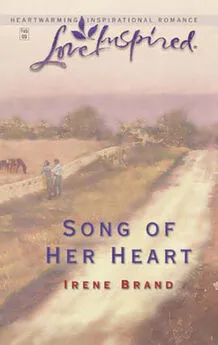Irene Brand - Listen to Your Heart
- Название:Listen to Your Heart
- Автор:
- Жанр:
- Издательство:неизвестно
- Год:неизвестен
- ISBN:нет данных
- Рейтинг:
- Избранное:Добавить в избранное
-
Отзывы:
-
Ваша оценка:
Irene Brand - Listen to Your Heart краткое содержание
Listen to Your Heart - читать онлайн бесплатно ознакомительный отрывок
Интервал:
Закладка:
Laurel hummed a hymn as she darkened her room and turned on a dim light beside her bed. She stretched, savoring the texture of the smooth sheets under her back. She crossed her hands behind her neck and listened to the cacophony of insect sounds outside the window. She also heard a cow bawling on her neighbor’s farm—probably trying to find its calf. The owl, nesting in the attic of Oaklawn’s garden house, serenaded its nesting mate. Last night the plaintive call of the owl had made her sad, but tonight she enjoyed it.
Micah’s coming had lifted her spirits. The rent he paid this summer would help with her finances, but she wasn’t sure that was the only reason she was pleased with her new tenant. She fell asleep thinking about him.
The ringing phone woke Laurel, and at first she thought it was the alarm clock, which she’d set for seven. A glance at the clock indicated it was after midnight. Her heart thumped rapidly, and her stomach churned with anxiety and apprehension. Following her in-laws’ custom, Laurel had developed the habit of going to bed early. Her friends knew she didn’t keep late hours, so who could be calling? She sat up and quickly lifted the receiver, hoping the phone hadn’t wakened Debbie. Maybe there was an emergency among the church family.
She swallowed with difficulty and hesitantly answered. “Hello?”
Her apprehension increased when no one answered her greeting. She knew someone was on the line because she heard uneven breathing. She almost dropped the phone when a pleasant, tenor voice started singing the words of an old song.
“I looked over Jordan, and what did I see
Coming for to carry me home?
A band of angels coming after me,
Coming for to carry me home.”
After a significant pause, the man said, “Be ready, Laurel, we’re coming after you.”
Laurel dropped the phone receiver on the floor, and reached out a trembling finger to sever the connection. She childishly pinched her arm to be sure she wasn’t dreaming.
She ran to the bathroom, sick to her stomach, and retched. Laurel rinsed her mouth, gulped a glass of water and staggered back to bed.
She was sorry now that she hadn’t stayed on the phone. She replaced the phone in its cradle and lay awake the rest of the night. Was there any way she could trace the call?
After she’d squirmed in the bed for several hours, Laurel got up, dressed in an ankle-length floral skirt and a soft, white cotton blouse, and quietly went downstairs. Because of the isolation of the house, she had two dusk-to-dawn security lights, which kept the grounds and the house partially illuminated all night long. Creeping along in the muted light, Laurel entered the kitchen and closed the door so she wouldn’t wake Debbie. She filled the teakettle with water and, while she waited for it to boil, placed a tea bag in her favorite mug.
Once made, Laurel wrapped her hands around the steaming cup and went to the screened back porch, where she’d encountered Micah yesterday. The front gallery contained only antique rocking chairs, but after she’d taken over ownership of the house, Laurel had made the back porch into a cozy, relaxing area.
Laurel sat on a padded lounge chair and sipped the tea as she contemplated what to do. If she’d had caller ID, she might have determined the identity of her caller, but with her limited income, she cut corners when she could, and the latest technology wasn’t high on her priority list.
When daylight dispelled the darkness, Laurel became aware of movement at her side. Remembering the threatening phone call, the cup tottered in her hand. Micah Davidson walked across the lawn. He halted when he saw her, and momentarily she wondered if he’d been the caller.
“Good morning,” he said. “You’re up early.”
“Earlier than usual,” she answered. “Couldn’t you sleep?”
“I don’t usually sleep more than six hours, and I went to bed early. I had breakfast while I waited for enough daylight to look around. You don’t mind if I explore your property, do you?”
“Of course not. There’s a cleared path to the river if you want to go that way.”
“That’s where I was heading. Would you have time to walk with me? I could use a guide.”
“Yes, I’d like a walk,” she said eagerly. She wasn’t in the mood for conversation, but it might be a good idea to learn more about Micah Davidson. She swung her feet off the lounge, kicked off the soft scuffs she wore and reached under the chair for a pair of walking shoes. She quickly pulled on the socks she’d stored in the toes of the shoes, and in a few minutes had joined Micah.
Pointing to the left, Laurel said, “The best path is through the orchard.”
The lawn was neatly mowed until they reached the orchard, then weeds grew profusely in the path. Laurel’s long skirt was soon wet from the abundant dew on the grass.
“In your research of Southern homes, you’ve probably heard many stories about keepsakes the Confederates buried before the invaders came. I mentioned Oaklawn’s story to you last night. Supposedly a Cooper ancestor buried gold and silver in this orchard, but the cache was never found.”
“Not even after the war?”
“No,” Laurel said, and her eyes sparkled, temporarily replacing the pain Micah had noticed. “My father-in-law said that when he was a boy, he and his brother dug from one end of that field to the other and didn’t find any money. But the cultivation did give them a bumper crop of fruit for a few years.”
Micah gazed appreciatively at the grainfields and the lush pastureland along the river.
“Oaklawn isn’t as large as it was in the eighteenth century,” Laurel continued as they walked. “At one time, the Coopers owned a thousand acres, but they’ve had to sell parcels of land during hard times. The farm is only fifty acres now. Actually, I’m glad it’s no more than that, because I can’t even manage that much land. My neighbor, Pete Howe, rents the farmland, so I only care for the few acres around the house. I have a riding mower, so it isn’t difficult work, but it does keep me busy during the summer. Especially this year, when I want everything to look nice for the wedding.”
Although she’d hoped walking would take her mind off the mysterious phone call, it didn’t, and she lapsed into silence, trying to figure out who had called her. The singer’s voice didn’t sound familiar at all.
Micah walked slightly behind Laurel since the path was narrow, but he was aware of her downcast eyes. When she’d joined him for the walk, he’d noticed at once that she wasn’t the contented woman he’d talked with on the gallery the night before. Had something happened to disturb her, or did it take a while for her to get going in the morning?
“I’d appreciate hearing anything you know about Oaklawn,” Micah said. “I want to feature the history of the homes, as well as the architecture.”
Laurel wasn’t in the mood for visiting, but taking a deep breath and staring straight ahead as they walked, she said, “The Coopers moved here soon after the Revolutionary War. The place was a wilderness then. They lived in log cabins and had the usual troubles with the Native Americans that most settlers had. Eventually they prospered enough for Debbie’s great-great-grandfather to build the original brick house, but the Cooper wealth declined over the next century.”
When they passed a knoll where the family cemetery was located, Micah commented, “I suppose your husband is buried here.”
“No, he isn’t,” she said bluntly, because she didn’t like to think about Jason’s death.
Micah couldn’t imagine why his question had annoyed her. They were both silent as they walked downhill to the northern bank of the shallow river. A wide beach of sand and gravel had formed at a sharp bend in the stream. Overhanging trees provided a secluded area. A few ramshackle lawn chairs and a wooden bench had been placed several feet from the water. Laurel walked to one of the sturdier chairs and sat down.
“Do people go swimming or fishing here?”
“Mostly fishing,” Laurel said shortly, her eyes on the river.
Did his presence annoy her, or was she troubled about something else?
After a pause, she continued, “But there is a deep pool midway in the stream. The local boys go to the other side of the river, swing on the vines and drop into the pool. It’s a dangerous practice. One boy was seriously hurt here last summer, but they continue to swim.”
The gentle ripple of the water as it slid past them was quieting, and the peace of the place was soothing to Micah. After spending over a year in the jungle, the past three months in the States—mostly in cities—had frustrated him. The noise of traffic had grated on his nerves. Pleased to have this sojourn in a quiet place, Micah sat on the wooden bench facing upstream. In this position, he could watch Laurel without being obvious about it.
Her present attitude didn’t compare to her quick flash of anger yesterday, which had disappeared as quickly as it had come. Her eyes brooded today, and there was a petulant droop to her full lips.
Early sunlight peeked into the shaded glade, a fish flipped in the middle of the stream and birds gently began their morning songs.
Without looking at him, her eyes staring across the river, Laurel said, “Mr. Davidson, I should apologize to you again. I had an unpleasant experience last night, or I wouldn’t have been so short-tempered. Let me give you a reasonable answer to your question about my husband’s burial. It’s always been a sore subject to me, but you wouldn’t have known that.”
Chapter Three
Several minutes passed before Laurel continued, and to spare her embarrassment, Micah kept his eyes on the river. A small flock of ducks drifted lazily with the current. Occasionally, one of them would tilt forward into the river for a morning snack.
“Twenty years ago, Jason and a friend were sailing off the Atlantic coast of South America, and their boat capsized,” Laurel said quietly. “Their bodies were never recovered. He was an only child, and his parents never got over his death.”
He noticed that she didn’t mention her own sorrow. If she’d been a widow for so long, perhaps the pain was gone. But why hadn’t she remarried? Judging by his own immediate attraction to her, she must have had plenty of suitors.
As though she read his thoughts, Laurel said, “Debbie, who was only two at the time, was all his parents had left of Jason. As I mentioned last night, they insisted that I stay at Oaklawn and raise my child here. I was glad to stay, because I didn’t have any other place to go.”
Many questions rose in Micah’s mind. Why was her husband’s death a sore point? She spoke as if she resented him, but it wasn’t any of his business. Laurel would tell him what she wanted him to know.
“Although it’s been a labor of love to rear Debbie as a single parent, it hasn’t been easy for me. I’m ashamed to admit it, but I’ve always resented Jason taking that trip and getting killed when he should have stayed home and looked after his family. Debbie has missed a lot by not having a father.”
Micah silently thought that Debbie might have been better off without her father’s presence. Jason Cooper sounded like a selfish man.
“His parents hoped almost to the end that Jason was still alive. When they at last conceded that he was dead, they didn’t live long. My mother-in-law survived her husband by two months. They wanted me to preserve the house for Debbie. I’m trying to do what they asked me to.”
“It hasn’t been easy for you, I’m sure.”
Читать дальшеИнтервал:
Закладка:










